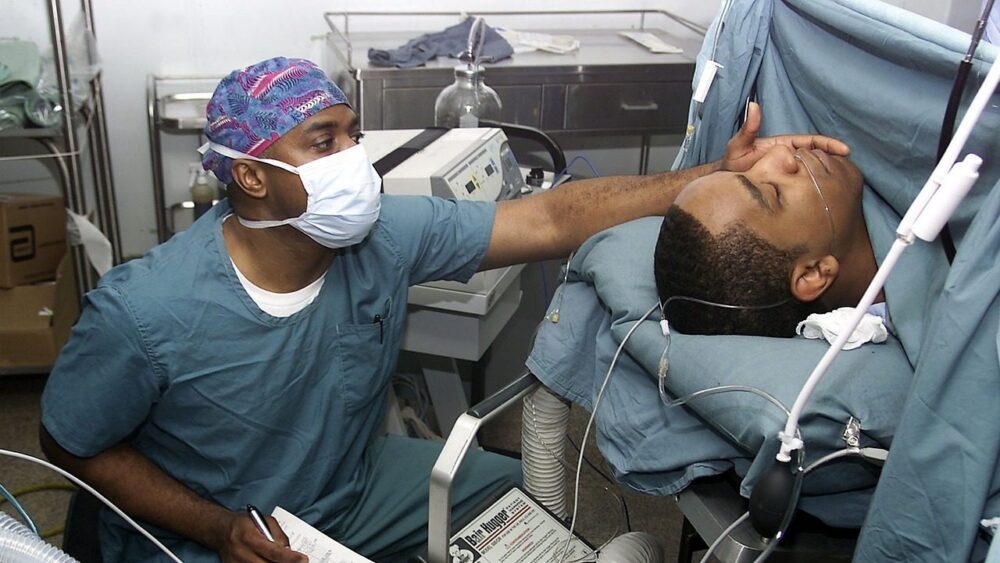
France’s new Interior Minister Bruno Retailleau, of Les Républicains, is considering ending the controversial AME (Aide Médicale d’Etat), which provides free medical assistance to migrants—including illegal ones. The Left sees this stance as a clear sign of the new team’s benevolence towards the ‘far Right,’ and some ministers have openly expressed their discontent.
Invited to appear on the TF1 television news on Monday, September 23rd, Retailleau asserted that he wanted to “take all possible means to reduce immigration in France.” Among these is the reform, or even abolition, of State Medical Aid (AME). This scheme, which entitles foreigners who have been present on French soil for at least three months to free medical care, is costing the state several billion every year.
🗣️ AME : "On la réforme (…) Je ne veux pas que la France soit le pays le plus attractif d'Europe pour un certain nombre de prestations sociales d'accès aux soins."
— TF1Info (@TF1Info) September 23, 2024
Bruno Retailleau (@BrunoRetailleau), ministre de l’Intérieur, invité de @GillesBouleau sur TF1 ⤵️ pic.twitter.com/72XY6n7Or5
AME reform is a thorny issue that regularly poisons the French public debate. Retailleau, former senator and head of the Les Républicains group in the upper house, declared his determination to overhaul France’s migration policy, which was incompletely reformed during stormy debates at the end of 2023. At that time, his parliamentary group had already tried to reform the AME, without success.
The left-wing coalition of the Nouveau Front Populaire (NFP) is, along with the left wing of Emmanuel Macron’s party, firmly opposed to any changes to the AME. In addition to the humanitarian aspect and the risk to public health, the Left claims that the cost of the programme is overestimated by the Right and that it does not act as the pompe aspirante—literally suction pump—or ‘pull factor’ for immigration that their political opponents claim it does. Yet abuses are well-known, numerous, and well-documented.
Other measures are under consideration, such as an “offence of illegal residence,” which existed in French law but was abolished under the presidency of socialist François Hollande. Bruno Retailleau said he was also in favour of introducing random border controls.
Retailleau explained that his approach was part of a European framework. He said he is keen to study the European legislation of countries faced with massive flows of immigrants to “form a kind of alliance with countries that want to take a firmer stance on immigration, in order to revise European texts that are no longer at all appropriate”. Hungary, Italy, Sweden, and the Netherlands are clearly identified by the minister of the interior as potential partners.
These statements have not gone unnoticed at the European level. A revision of the EU’s Asylum and Migration Pact seems inevitable, if the new minister is to be believed, but not only that; the Schengen Agreement could also be in his sights.
Finally, Retailleau spoke out in favour of renouncing the agreements between France and its former colonies, notably Algeria, which since independence has allowed Algerian nationals to benefit from a certain number of privileges that today weigh heavily on French security and finances. In an implicit reference to the work implemented by Meloni in Italy, he raised the possibility of “making agreements with the Maghreb countries so that there can be immigration retention.”
This seemingly firm statement will be judged by the actions that follow. From the point of view of pure political calculation, it could simply be a question of sending signals to the Rassemblement National and its blocking minority to attract the goodwill of the group of deputies led by Marine Le Pen and her allies. But it is likely to be a difficult game to play. Retailleau’s stated intentions, apparently supported by Prime Minister Michel Barnier, are far from shared by the entire government team, which means complex arbitration will be called for.
Aware of the possible resistance he may encounter in the National Assembly in the absence of a majority, the Minister of the Interior explained that he wanted to make maximum use of the regulatory power his position gives him. “I can go pretty far,” he explained.
